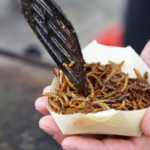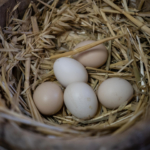
18 Nov Top Tips on how to reduce your festive footprint
Mark Boulet & Kim Borg report how Festive celebrations can leave you with more than one kind of hangover – what to do with the debris of leftover food, gift wrapping, damaged decorations and mountains of plastic packaging?
But with some preparation, a little restraint and a solid strategy, you might be able to avoid at least one type of hangover this holiday season.
Developed economies generate waste at far greater rates than their share of population, and developing nations are pushing back on our strategy of shipping waste offshore. We saw the results of this in Victoria recently with a number of councils forced to send recycling to landfill. And the food system globally is in a waste crisis, experts say.
Mark Boulet, a research fellow at BehaviourWorks, part of the Monash Sustainable Development Institute, says people don’t always recognise the broader potential impacts of food waste. That bag of spinach that turns to mush in the fridge is a symptom of a bigger problem.
“Food waste emissions account for about one-quarter of agriculture’s emissions overall, so it’s contributing to something that we well know is going to make life a lot harder for humans on the planet, which is climate change,” Boulet says.
With climate change, the land available to grow crops becomes threatened, requiring more resources such as fertilisers, water and energy.
“It’s a symptom of a system which is one of over-consumption, and means pretty much that, unfortunately, the human race is going to be running out of some of the fundamentals that we need to live,” he says.
“Food waste also drives up things like food prices. So we waste more food, food becomes a more in-demand commodity, and prices will go up. Which again affects a large part of the population that are already potentially struggling financially.”
The good news, according to Monash experts, is that a growing number of people are concerned about the way we generate, dispose of and process waste, and there are plenty of simple strategies we can all employ to reduce our waste footprint.
Top tips for reducing food waste:
- Have a plan when you go shopping
- Before you go, check what’s in the pantry and your fridge
- Write a shopping list and stick to it, to avoid getting caught up by promotions and discounts
- Store purchases properly – food should be at four degrees; that’s the optimal temperature to keep food fresh longest
- Cook only the amount that you know you’re going to eat
- Have a plan to reuse your leftovers.
Love Food, Hate Waste has some great resources and recipes
But what about those piles of paper and plastic we generate as part of the joy of gift-giving? Monash expert Kim Borg says the health of our planet depends on us rethinking how we use and dispose of plastic, especially single-use plastic.
“Estimates at the moment say that if we don’t change our behaviour … by the year 2050 there’s going to be more plastic in the ocean than fish,” she says.
“Eighty per cent of plastic either goes to a landfill, or ends up in the environment, and when it ends up in the environment, it pretty much ends up in the waterway, because it’s light and it floats and it’s waterproof.”
Borg, a research officer at BehaviourWorks, says we’ve cultivated a convenience culture when it comes to plastic, but increased awareness, better understanding and the power of social media is helping people understand how simple and easy it can be to tackle this issue. Borg, who worked with the Victorian state government on the plastic bag ban instigated in 2019, says she believes as more people take individual action, more businesses and governments will get on board.
“… the more people are doing these behaviours, the easier that they’re finding it, and the more social licence the government has to do more initiatives as well”, she says.
Tips for reducing plastic and packaging waste:
- Bring your own containers whenever you can to avoid packaging
- Talk to your favourite shops and outlets about bringing your own containers
- Say no to single-use items including straws, bottles and utensils
- Make sure you’re recycling correctly – find out which items your local council collects (Victorians can check this here)
- Sustainability Victoria has great tips on recycling correctly
- Petition the government – write to your MP calling for improvements to the recycling system in Australia, or sign online petitions.
Listen to the latest podcast ‘What Happens Next?‘ for more useful tips on how to play your part in reducing waste.
Mark Boulet & Kim Borg, BehaviourWorks, Australia
This article was first published on Monash Lens. Read the original article



